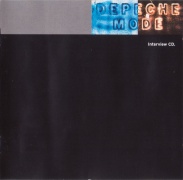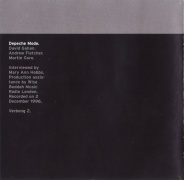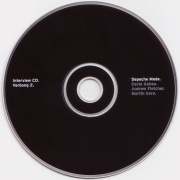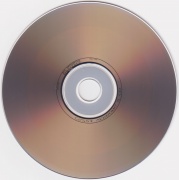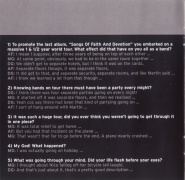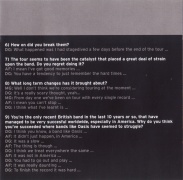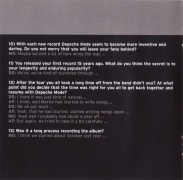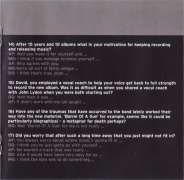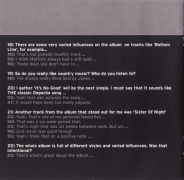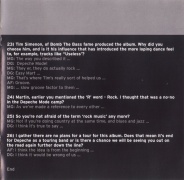1996-12-02 Wise Buddah Studios, London, England, UK
Notes
Depeche Mode was interviewed by Mary Ann Hobbs on December 2, 1996 at Wise Buddah Studios regarding events that transpired during the "Devotional" and "Exotic" tours and the recording process of "Ultra". The interviewer is not heard, only the band's responses are present. A transcript of the tracks is provided below and in the archive as "transcript.txt", many thanks to Angelinda for her effort.
This is sourced from the officially released interview CD with catalog number “Verbong 2”.
Track list
- [1:30] Play To promote the last album, "Songs Of Faith And Devotion" you embarked on a massive 1 & 1/2 year world tour. What effect did that have on you all as a band?
- [1:00] Play Knowing bands on tour there must have been a party every night?
- [0:30] Play It was such a huge tour, did you ever think you weren't going to get through it in one piece?
- [0:50] Play My God! What happened?
- [1:26] Play What was going through your mind? Did your life flash before your eyes?
- [0:29] Play How on Earth did you break them?
- [0:55] Play The tour seems to have been the catalyst that placed a great deal of strain upon the band. Do you regret doing it?
- [2:02] Play What long term changes has it brought about?
- [3:04] Play You're the only recent British band in the last 10 years or so, that have managed to be very successful worldwide, especially in America. Why do you think you've succeeded where bands like Oasis have seemed to struggle?
- [0:19] Play With each new record Depeche Mode seem to become more inventive and daring. Do you not worry that you will leave your fans behind?
- [0:49] Play You released your first record 15 years ago. What do you think the secret is to your longevity and enduring popularity?
- [1:04] Play After the tour you all took a long time off from the band didn't you? At what point did you decide that the time was right for you all to get back together and resume with Depeche Mode?
- [0:45] Play Was it a long process recording the album?
- [1:05] Play After 15 years and 10 albums what is your motivation for keeping recording and releasing music?
- [2:07] Play David, you employed a vocal coach to help your voice get back to full strength to record the new album. Was it as difficult as when you shared a vocal coach with John Lydon when you were both starting out?
- [0:53] Play Have any of the traumas that have occurred to the band lately worked their way into the new material? "Barrel Of A Gun" for example, seems like it could be particularly biographical - a metaphor for death perhaps?
- [1:31] Play Did you worry that after such a long time away that you just might not fit in?
- [1:04] Play There are some very varied influences on the album on tracks like "The Bottom Line" for example...
- [0:59] Play So do you really like country music? Who do you listen to?
- [0:34] Play I gather "It's No Good" will be the next single. I must say that it sounds like THE classic Depeche song...
- [0:47] Play Another track from the album that stood out for me was "Sister Of Night".
- [0:21] Play The whole album is full of different styles and varied influences. Was that intentional?
- [1:51] Play Tim Simenon, of Bomb the Bass fame, produced the album. Why did you choose him, and is it his influence that has introduced the more loping dance feel to, for example, tracks like "Useless"?
- [0:22] Play Martin, earlier you mentioned the "R" word - "rock". I thought that was a no-no in the Depeche Mode camp?
- [0:53] Play So you're not afraid of the term "rock music" anymore?
- [1:06] Play I gather there are no plans or a tour for this album. Does that mean it's the end for Depeche as a touring band, or is there a chance we will be seeing you out on the road again further down the line?
- Total time: 28:15
Listen
You can listen to this entire recording below in one shot if you don't want to keep clicking play on each track, though it may be a little difficult to follow without interviewer questions between the tracks.
Transcript
The interviewer is not heard; only the band's answers are heard. Keep that in mind when listening along to the transcript.
01. Play To promote the last album, "Songs Of Faith And Devotion" you embarked on a massive 1 & 1/2 year world tour. What effect did that have on you all as a band?
FLETCH: I suppose, after three years [of] being on top of each other - sorry, don't want to be misleading there - there was a sort of thing of not being in the room with each other, [which] was sometimes a bit tense, but it never got to actually fighting... yet.
MARTIN: At some point, obviously, we had to be in the same room together. And we did manage to actually carry that off for 14 months. It's just [that] at some point, separate limos were necessary.
DAVE: We didn't get to separate hotels, but I think it was on the cards if we-
F: -Separate floors, though!
D: We were "separate" everything: separate security, separate dressing rooms, and like Martin said, the room when we were together was on stage, and we functioned together well on stage. We all had our role and knew what we were doing. I think that was the most comfortable place. The rest of the day, when you're doing that 24 hours a day, seven days a week... The thing you have to remember is, it's not just band; there's a hundred people working with us altogether. It's everybody: it's everybody's emotions, all wrapped up there together, and sometimes there's gonna be conflict.
F: I think you learn from that, don't you-
D: -Yeah, I think now we can.
F: I think we took a lot on, I think we took too much on, and hopefully in the future now, we've learned our lessons.
02. Play Knowing bands on tour there must have been a party every night?
D: There was full, separate parties going on every night!
M: When it started off, it was separate floors, but then we realised that you could still be above or below somebody.
D: [laughs]
M: So we had to be on separate floors and opposite ends, like a sort of zigzag pattern. [laughs]
D: Because there would be: say someone was having a party, say that there had been, like, that kind of partying going on, [like] most nights, till you leave the next day. If someone had a particularly bad hangover one night and they wanted to rest, it was pretty much impossible, and you'd end up... I mean there was lots of times on tour I remember ending up coming out of my room and just following the noise, and ending up in Mart's room.
F: I sort of hung around with Martin, but the only thing was that we were on completely different timescales. I'd be up during the day and he'd be up during the night.
03. Play It was such a huge tour, did you ever think you weren't going to get through it in one piece?
M: Yeah I know, it was a total relieve to get home at the end of it. It especially got bad with about two or three weeks to go, because you feel... I personally feel, I made it this far, and it would be really ironic and sad to die at this stage.
F: When you had that incident on the plane? Was that near the end?
M: That wasn't that far to go before the end, yeah, when our plane nearly crashed.
04. Play My God! What happened?
M: I was actually going on a holiday, but I was in the same plane as Alan... Wilder, the one who left. We were on our way from Dallas to, I think it was San Juan. It was a big American Airlines plane, and it just started making this horrific noise and tilting totally sideways and plummeting to the ground. The stewardesses were trying to run around, but obviously it's difficult running around at that angle, [laughter] telling everyone not to panic. But they looked really panicked themselves, and at that [point] we thought we were actually dead. It took the pilot about ten minutes to actually make an announcement, saying that "We had a pressurisation problem."
05. Play What was going through your mind? Did your life flash before your eyes?
M: I thought about Nico, falling off a bicycle. [laughter]
D: That's it, that's a good description, you know. Because, I mean, we've been on a plane, every single day, our own plane, for about 15 months, and we went through... You know, there was a couple of times, when you do that every single day, the law of averages is that you're gonna... What was it? "One in a million?", something like that? But, if you're flying every single day, the chances of something happening are a lot higher. I remember going home from the tour, I remember flying home from, eh... Where was it [that] we finished up? Was it Indiana, or something like that? [silence] I can't remember, but I remember being in a lot of pain, which wasn't that unusual, so I was drinking to cover it up. But as I was sobering up, and contemplating the end of the tour, and I had this pain inside of me and stuff, so when we got back, we got straight to the hospital, and I was examined and I had two fractured ribs and I was internally bleeding. And when I actually started coming down from that as well... So I spent six months after the tour being strapped up, and that was really when I felt a lot of pain, because when you've got a couple of fractured ribs, if you just cough lightly, or sneeze, or laugh, you can't move.
06. Play How on Earth did you break them?
D: What had happened was that I had stagedived a few days before the end of the tour somewhere, and had gotten to the end of the stage and then realised that the pit was about 20 foot but it was too late, I had already dived off stage, I was like, "I ain't gonna make it", and I landed on the crash barrier halfway, and then was dragged into the audience, and I was like "Ahhhh!", you know.
07. Play The tour seems to have been the catalyst that placed a great deal of strain upon the band. Do you regret doing it?
F: There's a lot of good memories about the thing, but it was a long, quite big chunk out of your life.
D: You have a tendency just to remember the hard times, as well, and the bad moments. I think that is often the way of life. And, like Fletch said, the rewards that you got from it were fantastic. I mean, we played a lot of shows to sell-out audiences, in I don't know how many cities, for a long while, and, we did it. We completed what we had set out to do. I just think it was really... We didn't realise how insane it was till we were actually right in the middle of it and couldn't stop.
08. Play What long term changes has it brought about?
M: Well, I don't think we're considering touring at the moment with this album, which is the first time we've ever contemplated not doing that.
D: It's a really scary thought.
M: From day one, we've been on tour of every single record, even if it was only for six weeks.
F: I mean, you can't just stop, because, you've have to think that you've got something to offer. And, really, the music was and is sounding still very good. But you have to try and learn from what's going on.
D: I think that what I've learned, is that, if I haven't got my health, I haven't got anything. If I'm not able to get up in the morning and feel good about myself, then everything around me is chaos anyway. And, I've gotten really tired of being tired. And it took a really long while, it took a couple of years after the tour, really. Like you said before, I could stop using drugs, and now I'm happy to say I've been clean for six months. It's in the past and I can't change the past. But I can be really careful about the future, because, no matter what goes on in my life, and no matter what I'm doing, I know that at the end of the day, you have to sit with yourself. I wasn't very proud of myself for a long time. And all that kind of stuff that was happening to me really... Like, I wasn't able to see anything good anymore. And that's what I think is... It clouds your vision, if you become an addict, and you use drugs and alcohol to function with, to cover up, to mask yourself. You're never really gonna find out who you really are and what you really want. And I think that we stopped for a long time after the tour, and I saw what I was and I didn't like it. [I'm] glad I had long enough to see it, but it took a long while before I realised.
09. Play You're the only recent British band in the last 10 years or so, that have managed to be very successful worldwide, especially in America. Why do you think you've succeeded where bands like Oasis have seemed to struggle?
D: I think that with a band like Oasis it's all happening so fast.
F: In America, for us, it didn't happen overnight. It took till about 198- It a good five or six years at it, gradually doing it. Gradually selling more, gradually doing better, to more people. It's a long haul.
D: It was a slow... Yeah, it was really slow we constantly went back, like Martin said, with every record and toured. This is our tenth albums that we're about to release, our tenth studio album, and I don't know about anyone else, but, it can be so overwhelming. It's something that you have to have practice at to be able to take in everything that's happening to you. I'd hate to be in that kind of position where you're, like, named as being the biggest band in the world, and all that kind of stuff. That's a really tall order to live up to.
F: Thing is, though, a lot of British bands have a very insular viewpoint. We've always worked abroad more than we have in this country. We always recorded our albums abroad. We've always been away. Britain, for us, has never been a very much a major market for a long time. Some of the lot of British bands, they will slag off the Americans. But you can't do that with Americans.
D: I think we treated everywhere the same. That's something that we did. We didn't set out to say, "Let's be the biggest band in the world." We didn't set ourselves up to lose, if you like. We kind of just went out and treated everywhere the same, and we just worked hard at trying to get our music across to people. Really, when we first started in the early '80s, as well, alternative music, if you like, wasn't played a lot on the radio everywhere.
F: It was not in America, was it?
D: No, and you had to go out and play, and tour, and MTV wasn't that big, and all the different mediums that there are now to get your music across. I think sometimes it's that the band seems to... We've always been a touring band. So this is quite different for us, really, with this record. The way we're setting out with it is.. We don't know if we're ready to go on tour. I think it's good, because I think it's nice to be able to finish something, appreciate it, and enjoy it, rather than just running to the next thing and not being able to sit back and enjoy what you've done. And that's what's good about making this record. I think it's been a more enjoyable process, generally. The last album we that made, we knew at the end of the album that we would be going straight into the rehearsal room, and straight out on the road, and so...
F: It was daunting. It was really daunting.
D: It was just the beginning for us, really, to finish to record. It was hard to even appreciate what we had done for a year, because we just went out with it.
10. Play With each new record Depeche Mode seem to become more inventive and daring. Do you not worry that you will leave your fans behind?
M: Maybe we lost a lot of fans along the way and gained others, maybe that's what it is. Maybe there aren't that many that have been there all the way through.
11. Play You released your first record 15 years ago. What do you think the secret is to your longevity and enduring popularity?
D: [laughs] We have sort of stumbled through, you know. And, just, we've played our game, we haven't played anybody else's game. I think that's one of the reasons why we survived. I think when you start to kind of analyse what you do, you lose interest. If you try to really kind of analyse and discuss every element of what you do, any of the risk factors or anything, it's gone. The minute you, I think, are talking about something too much and are getting into it, any of the kind of naivity or excitement out of it is taken away.
12. Play After the tour you all took a long time off from the band didn't you? At what point did you decide that the time was right for you all to get back together and resume with Depeche Mode?
D: Hmm, I think it was kind of natural, it was about time, kind of thing.
F: I think, well, Martin started to write songs.
D: Yeah, and we all got word, through the grapevine, and we continued.
F: He had started, he had started writing songs again, which was probably a big effort for him, after about three years.
M: I probably had about a year off, somewhere near a year off after the tour, before I actually started writing again. I suppose it was when I had got about six or seven songs together that we felt that maybe it was about time we thought about getting back in the studio.
F: But, again, we try to take it a bit carefully, and not sort of [like] in the beginning, committing ourselves to an album as such. Just sort of going in the studio and see how it goes, and then it sort of gradually went from that to making an album.
13. Play Was it a long process recording the album?
M: I think we started about October last year, so we've been on it now for 13, 14 months. But that hasn't been solidly in the studio. We've always worked in a similar sort of way, where we've had about a six-week-recording session, and then I get another writing session, of another, let's say, two months or so. And then we see what new material has come up, what we haven't finished recording from the previous session, and go in and start working on whatever is left.
14. Play After 15 years and 10 albums what is your motivation for keeping recording and releasing music?
F: Well, you make it for yourself, and also it's nice to turn people on. You hope that people are going to like it.
M: I think if you manage to move yourself somehow, then there is always going to be somebody out there-
F: -That agrees with you.
M: You know, we're all sort of fairly unique, but I think that there is always some sort of basic emotions that reach most people.
D: That's true, yeah. I think that when I sing Martin's songs, I know inside when it's right. And if it moves me, [then] I know it's going to affect, because that's just the way people are. And it's nice to be able to sing a song with your feelings, from your heart. And when I sing, I'm able to let so much more out than if I try and talk about it.
15. Play David, you employed a vocal coach to help your voice get back to full strength to record the new album. Was it as difficult as when you shared a vocal coach with John Lydon when you were both starting out?
D: Yeah, well, that was the only other time when I had worked with a vocal coach, and I wasn't into it. My heart wasn't into it, and I didn't really... It was just a chore, and I think it was for John Lydon as well [laughs]. She used to tell me that he refused to sing, and he would sit in a corner and sulk until Malcolm would come and pick him up. And I went there and I had sort of done the stuff, and I can't even remember what album it was with, but... This time around, we were in New York. I had been struggling to sing a lot of songs, generally, because I was pretty sick. And I had kind of reluct, and we had a meeting, and it was suggested to me that maybe I try working with a vocal coach to help me to really do what I do, but do it better. I reluctantly worked with Evelyn, and to my surprise, really, within a few weeks, I realised how much better my voice was getting. I worked with her every day for weeks in Los Angeles and before I even went into the studio, going over the songs on the piano and tearing them apart, and diction, and everything: tuning, different ways to sing them. I learned a good lesson, that basically you never stop learning, really. You don't have to [stop], you can always pick up an instrument and start, or anything. You don't have to... I felt like I knew what I was doing, and it was like... I just couldn't do it because of various other reasons, but I bettered what I thought I could do, which was a great surprise to me, and also it's really enjoyable to hear it back now. I kind of surprised myself, really, when I hear things, I feel really proud about it. Her job is to bring out the best in a vocalist, and she's really good at doing it. I mean, you've got to be able to sing in the first place, I think [laughs].
F: It didn't work with me. [laughter] I tried to ask her, but she won't work with me.
16. Play Have any of the traumas that have occurred to the band lately worked their way into the new material? "Barrel Of A Gun" for example, seems like it could be particularly biographical - a metaphor for death perhaps?
M: Well, "Barrel Of A Gun", for me, is not really... It's more sort of figuratively speaking. It's about not having as much choice to make decisions as you'd like. I really think that we're all born with some sort of genetic lineage that we can stray from, but we can only stray slightly from that path, and there's also you're whole social background, as well. We've all got certain cages that we're in. That's what the song's about. So it's like, "I didn't particularly have many choices to be in the position I was in, or [that] I am in." So it's not about death. The rest of them are about death.
17. Play Did you worry that after such a long time away that you just might not fit in?
F: I mean, you always worry about where music is going to fit it, you always just don't know how it's going to be received. We haven't made a record for a few years, but I mean, it is a storming track. But that's the same with all our records: you never know if they are going to fit in.
D: I think you just got to fit with yourself, if you feel confident about it, and [if] for yourself it's just right, really.
F: We wanted a track in which it was really going to come straight in, like "We're back".
D: Also, it would have been very easy for us, there's some other songs on the album that would have been just easier for us to put out as Depeche Mode, and, if you like, sound more like the Depeche Mode that everybody knows already. And I think that "Barrel Of A Gun" just kind of challenges what Depeche Mode have done before. That's something that I think is really important for us. And when we all came to the same decision that we wanted really, in our hearts, "Barrel Of A Gun" to be the first single, it was a pretty easy decision. We all knew it was right.
M: I think the idea was to do something that was a bit more clob- clob? [laughs]
F: Clossy? Clob? What? [laughs]
M: Club, club, club-orientated. It's really funny when you come to remixes these days, because it's "We'll give them this amazing track, see what they can do to it". Basically, they come back with a totally different track. So really, you can give them anything!
18. Play There are some very varied influences on the album on tracks like "The Bottom Line" for example...
M: That's a pseudo-country track. I think that when you write and make music, you should take your influences from anywhere anyway, anything you listen to. And I think people get far too narrow-minded. They listen to basically anything that's gone over the last five to eight years, and forget the rest of the whole history of music. I think there's a lot of interesting things, really interesting music has happened over the last hundred years or whenever recordings first became available. There's definitely a lot of stuff in the '20s, '30s, '40s, and '50s that's really interesting, and that song is a bit of a country influence.
D: I think Mart's has always had a soft spot for country. He just wanted to try his hand in it [laughs].
M: These days, you don't have to stop at the track stops: you can go down Oxford street, it's easier.
19. Play So do you really like country music? Who do you listen to?
M: I've always really liked George Jones. I actually really like a lot of gospel music as well, which people find really strange. And that probably comes in at some point, because a lot of the songs touch on religion, and even though this one has far less religious references than others, there's still references to, like, Jonah, Adam and Eve, all that stuff. But they are just really minor, throwaway things this time, as opposed to there being, like, titles and main themes. So the gospel angle comes in, the blues angle comes in. Even on this album there's one track that's going down the blues path at the moment. And we've had loads of blues references in the past with things like "Personal Jesus", songs like "Clean"...
20. Play I gather "It's No Good" will be the next single. I must say that it sounds like THE classic Depeche song...
D: That was the song that we was going to release as the first single. And it was exactly for that reason that we decided not to. Not because we didn't feel the song was good enough or anything like that, but just because we felt it was very safe for Depeche Mode to put out a song like that. It wasn't really challenging ourselves or the listener.
F: It would have been too easily popular.
21. Play Another track from the album that stood out for me was "Sister Of Night".
D: That's one of my personal favourites that's on the album, I would say. That was a song that we did record in New York but pre-Evelyn. That's about all I did [laughs]. That's all I managed to do.
M: That was a six-week-period, that.
D: Yeah, it took six weeks, in between nods on the stool, but...
M: The end result was good, though.
D: Yeah, I think that on a positive note, what we did with that song and with the vocals and everything, we really kind of set a precedent for the rest of what we wanted to do. And I think that's, for me personally, one of the better vocals that I've produced.
22. Play The whole album is full of different styles and varied influences. Was that intentional?
D: That's what great about the album: it's got a couple of rockers, couple of ballads, a bit of country. A bit for everyone, there.
23. Play Tim Simenon, of Bomb the Bass fame, produced the album. Why did you choose him, and is it his influence that has introduced the more loping dance feel to, for example, tracks like "Useless"?
M: The way you described it, "loping", I can't remember the speed of that one now, but there's nothing on this record that goes over 97, 98, maybe 99 beats a minute, which is quite slow. But somehow, the ones that do reach these sort of dizzy speeds-
D: -For Depeche Mode!
M: [laughs] Yeah, they do actually rock. And I think that-
D: -Wow, easy, Mart.
M: That's where Tim has really helped us out, because the way the songs were written and demoed before, they lent themselves to a dance direction, but not dance in a disco sense, it was more of a slow, loping dance. So that's what we hopefully achieved here. So when the first batch of demos were finished, it was fairly obvious then that there was a dance angle, dance slant in them, even though the songs weren't sort of disco speed. They did have this...
F: Groove.
M: ...slow groove factor to them that was almost like hip-hop grooves. And so we immediately started thinking about someone to work with that was in a dance field. Not necessarily totally in a dance field; we didn't start thinking about Nile Rodgers or anything... [laughter]
M: I can't remember, it was quite early on, I think it was Daniel Miller who actually first suggested Tim to us. And as we've known him for years anyway, we've met him quite a few times, and he's actually worked with us, he has done remixes for us in the past, he seemed like a really good, natural choice.
24. Play Martin, earlier you mentioned the "R" word - "rock". I thought that was a no-no in the Depeche Mode camp?
M: As we've made a reference to every other form of music, it's OK to use the term rock! It's only when it's used in isolation that we don't like it.
25. Play So you're not afraid of the term "rock music" anymore?
M: Not if you're doing country at the same time, and blues, and jazz, then it's OK.
D: I think it's true to say that there's elements of every kind of music in Depeche Mode. And that's what unique about us, that we don't kind of limit ourselves to one area. [For] a lot bands, it's a shame that they kind of trap themselves into that corner, and they establish themselves in that area, and then it's almost impossible for them to move out of it. We can go pretty much wherever we want with a song and I think that's what we do. We listen to a song and we complement the song and take it to that place, rather than sticking to a format.
26. Play I gather there are no plans or a tour for this album. Does that mean it's the end for Depeche as a touring band, or is there a chance we will be seeing you out on the road again further down the line?
F: I think the idea is from the beginning, though, that you're not making too many decisions ahead of time, and to take it relaxed. If things go well, then there might be a chance of touring. Things have a certain pace, these days. We're getting old.
D: I think it would be wrong of us to say at this stage to say that we're going to do something that we're not even sure that we're going to do, at this stage. We're just finishing the record. The next stage is to promote it, and that's something that we didn't as maybe - and when I say promotion, I mean with the interviews like this, and TV, and magazines, and stuff like that - we didn't do so much of that with the last album. We had done a lot of with Violator. And we'll see what happens for the next three or four months. After up until when the album is released in April, we'll be pretty much promoting it around the world, doing this kind of thing. Then we see how we feel after that. If we make any big plans now, I think it overshadows too much what you are trying to do today, and to stay in the day is, like, one of the hardest things to do, but to think too much into the future we'd be missing out on what we're trying to do right now.
Lineage
- Lineage: Depeche Mode - Interview CD (Verbong 2) -> Exact Audio Copy v1.0 beta 6 (optimal settings) -> FLAC level 8
- Rip: DMLiveWiki
- 300 dpi artwork and CD scans included; scanned using CanoScan LiDE 25 flatbed scanner
- EAC log, cuesheet, and auCDtectTaskManager log included
- Catalog Number: Verbong 2 (Depmod info | Discogs info)
Artwork
300dpi PNG artwork scans are included in the download.
Download
- Download ZIP - FLAC 16-bit 44.1khz - 139MB
